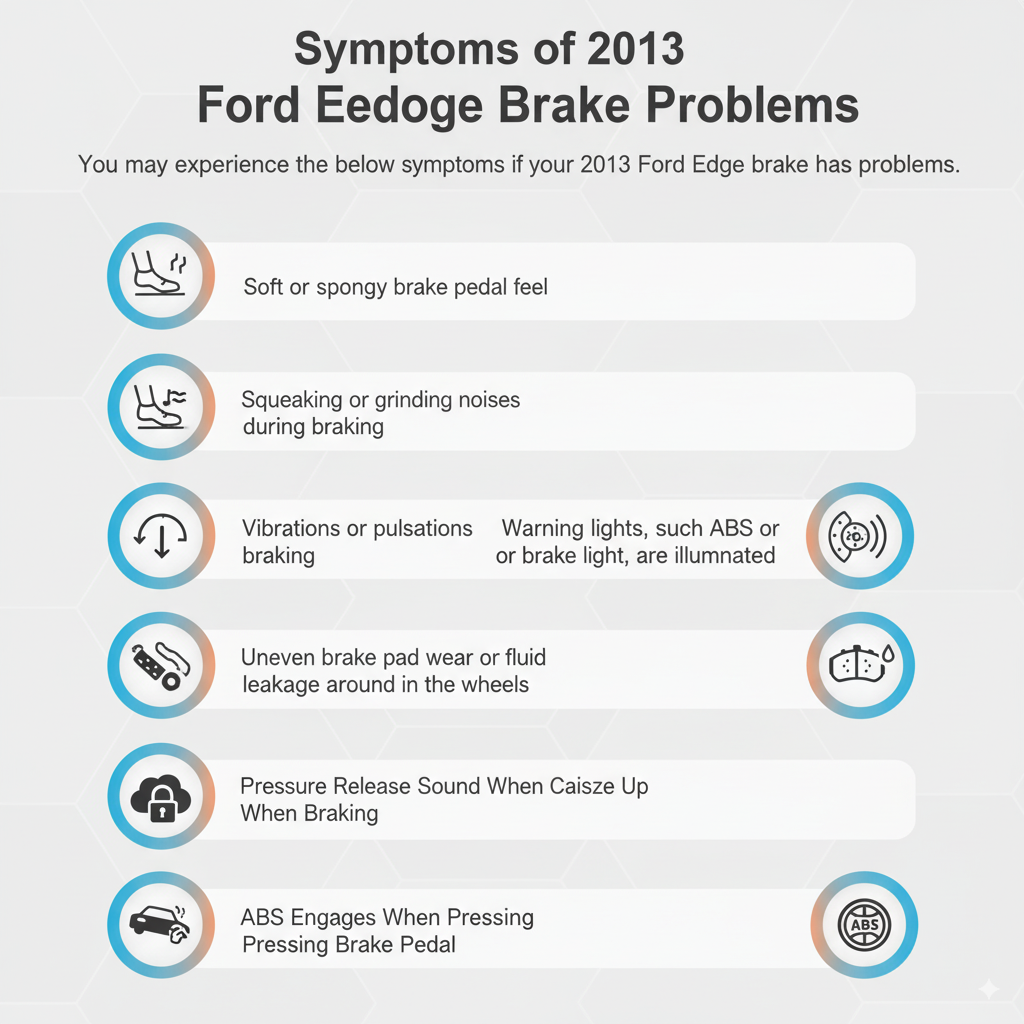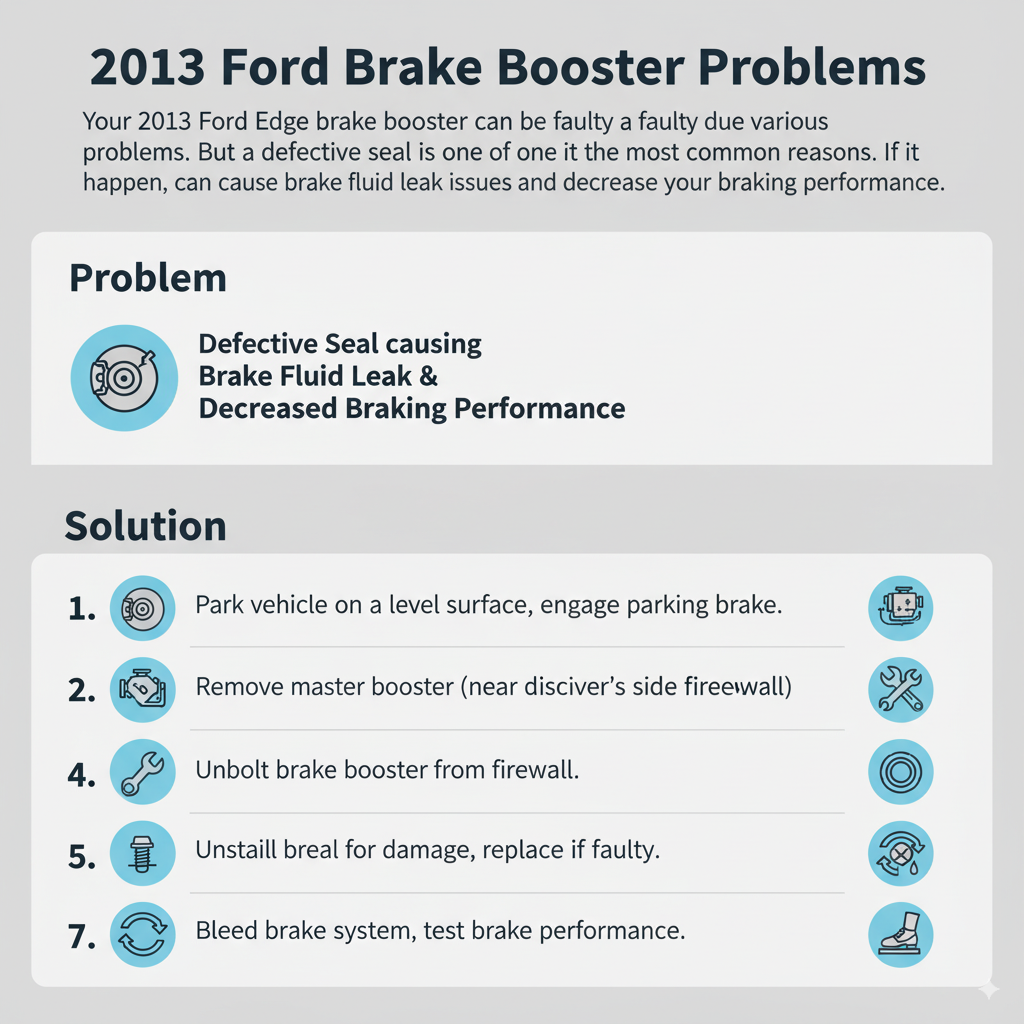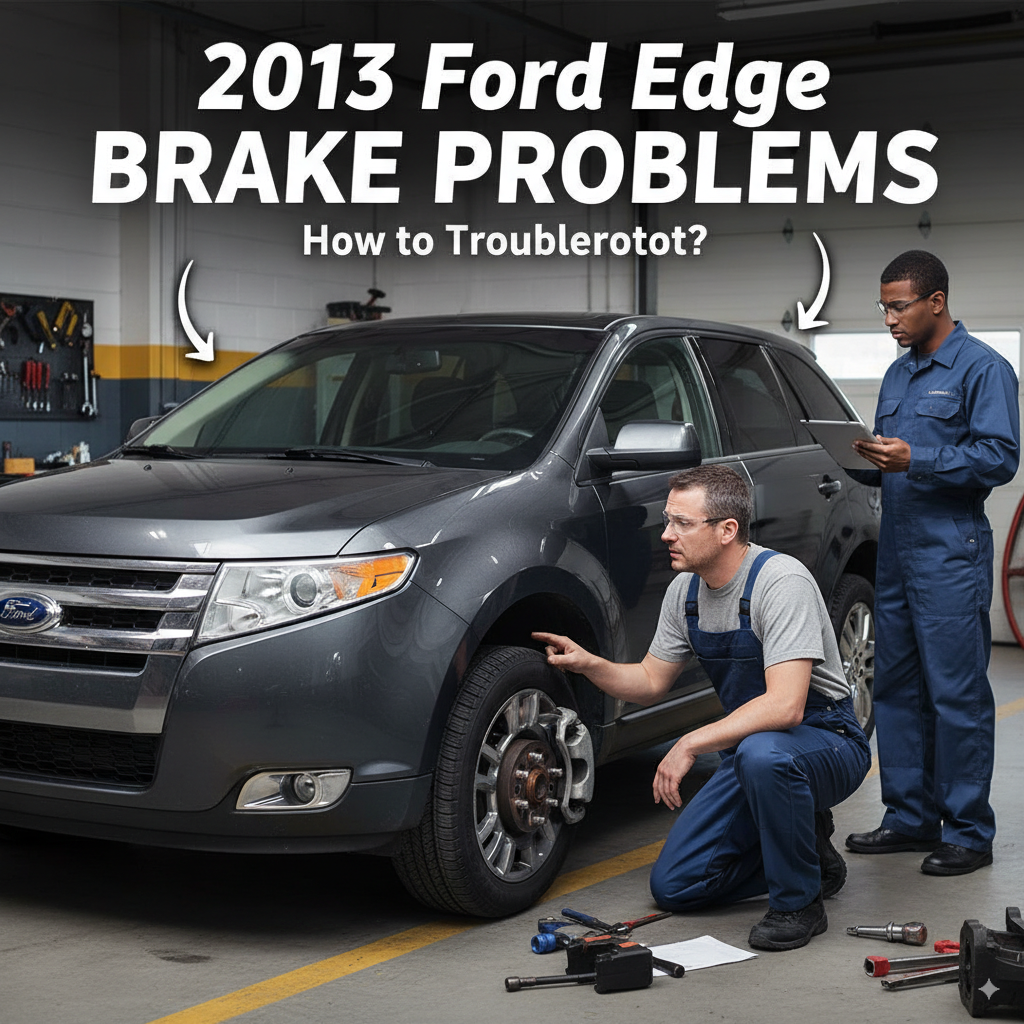Ford Edge is supposed to be a reliable vehicle. Over time, you may experience brake problems on your 2013 Ford Edge. It may make your expensive vehicle’s performance worse. How do you troubleshoot the 2013 Ford Edge brake problems?
Brake fluid contamination and hose leaks are common reasons for brake problems on the 2013 Ford Edge. You can fix it by replacing the hose or brake fluid. But wrapped rotors, faulty brake calipers, and brake wear can also be the causes.
Here, I will discuss different brake problems on the 2013 Ford Edge and ways to fix them. Stay tuned and explore.
Symptoms of 2013 Ford Edge Brake Problems
You may experience the below symptoms if your 2013 Ford Edge brake has problems.
- Soft or spongy brake pedal feel.
- Squeaking or grinding noises during braking.
- Reduced braking effectiveness.
- Vibrations or pulsations while braking.
- Warning lights, such as the ABS or brake light, are illuminated.
- Uneven brake pad wear or fluid leakage around the wheels.
- Brake Booster Failure
- Pressure Release Sound When Braking
- Rear Calipers Seize Up
- Braking Unexpectedly
- ABS Engages When Pressing Brake Pedal
Do you want instructions on how to place an extra trie in front? Here is a guide for you: Can you put a spare tire on the front

Causes of 2013 Ford Edge Brake Problems
Here is a list of a few common causes that may make your 2013 Ford Edge braking system faulty. You must check for the below 5 reasons when facing problems.
- Premature Brake Pad Wear
- Faulty Brake Calipers
- Brake Fluid Contamination
- Brake Rotor Warping
- Brake Hose or Line Leaks
2013 Ford Edge Brake Problems[ Problems & Solutions]
Problem 1: Premature Brake Pad Wear
Premature brake pad wear in a 2013 Ford Edge can cause brake problems. Due to reduced friction material and compromising stopping power, your brake performance may be reduced. Factors like aggressive driving, low-quality pads, or issues with calipers and rotors may accelerate quick wear.
Solution:
- Lift your Ford vehicle onto Jack stands. If you do not have a Jack stand, I recommend VEVOR Jack Stands to support your heavy vehicle.
- Check for the brake pads’ uneven wear.
- Then, measure their thickness and ensure it should be according to specifications. If the thickness is less than required, replace the pads.
- After that, check the calipers for uneven pressure or sticking.
- Also, check the brake rotors and ensure they are fine.
- Replace the components needed.
- After replacement, take a test drive and ensure the brake is working.
Problem 2: Faulty Brake Calipers
Faulty brake calipers on a 2013 Ford Edge can cause brake problems and may reduce braking efficiency. Faulty calipers may not correctly engage the brake pads. It can cause uneven braking, increased wear, and compromised stopping power.
Solution:
- Lift your car and remove its wheels using a screwdriver or bolt remover.
- After that, check the brake calipers for leaks or damage.
- Also, check for uneven brake pad wear. If the pads are broken, replace them. I recommend BOSCH BC1377 QuietCast Premium Ceramic Disc Brake Pad Set for Ford Edge 2013.
- Next, check the caliper pistons for proper movement.
- Reassemble the components and test the brakes before driving.
Problem 3: Brake Fluid Contamination
Brake fluid ensures the proper hydraulic pressure for braking system performance. But over time, contamination in brake fluid can make things worse. A contaminated fluid may cause problems with proper functioning, which may reduce braking efficiency and increase safety issues.
Solution:
- Park your vehicle on a leveled surface and let it sit for at least 20 minutes to bring the brake fluid to the correct level.
- Now, locate the brake fluid reservoir. It is usually located near the vehicle’s firewall. It is a smaller container that may be labeled “brake fluid.”
- Check the brake fluid; remove it if it is discolored or has some contaminants.
- Now refill the tank with the correct brake Fluid.
- After refilling, bleed the brake system.
- Close the reservoir and test the brake performance to ensure the problem is fixed.
Are your brake lights faulty on your Ford Ranger? Read this blog: Ford ranger brake lights not working
Problem 4: Brake Rotor Warping
A smooth rotor in the brake system ensures good performance. But over time, you may experience excessive friction due to wrapped rotors, which may produce heat and affect the brake performance on your Ford Edge 2013. Regular maintenance helps prevent such issues.
Solution:
- Raise your vehicle on the jack stands and check the brake rotors for visible damage.
- If you want more detailed checking, you can use a micrometer to check the rotor surface.
- Spin and observe the wobbling on your rotors.
- If the brake rotors are warped, replace them with compatible ones.
Fix your brake light bulb problems after reading this blog: Ford escape brake light bulb fault
Problem 5: Brake Hose Leaks
A brake hose is responsible for correct hydraulic pressure. If there is a leak in the hose, the pressure may be reduced. A low hydraulic pressure may affect the brake performance. It is essential to quickly repair the hose to prevent serious issues.
Solution:
- Lift your vehicle and check the brake hoses for visible damage or corrosion.
- If there is a leak, repair it using tape. If the hose is badly damaged, then it is better to replace it.
- After replacing the hose, check the connections and make sure there is no leakage at connection points. If loose, tighten them.
- Reassemble the components you removed.
- To make sure the brakes are functioning properly, lower your car and check their performance.
If you have time, read this article; it may help you fix brake controller issues: Ford Integrated trailer brake controller problems
2013 Ford Edge Limited Brake Problems
Your Ford Edge limited brake may be faulty for many reasons. Among the top reasons, brake wear, brake fluid leaks, and faulty master cylinders are common. You should check for these problems first to quickly fix the problem.
Solution:
- Locate your brake pads and rotors to ensure they are okay. If the rotor or pads are faulty, replace them.
- Next, check for the master cylinder. If the cylinder is okay, go for a brake fluid check. Otherwise, arrange for master cylinder replacement.
- Finally, check for brake fluid. If brake fluid is low or contaminated, remove and refill.
- After that, test your brake performance and ensure everything is okay.
2013 Ford Edge Anti Lock Brake Problems
Your 2013 Ford Edge may experience anti-lock brake system problems due to a faulty sensor or control module. These issues could lead to ABS malfunctions, affecting braking performance. Immediately check and fix the issue to improve your vehicle’s performance.
Solution:
- Park your vehicle in a safe place and turn it off.
- Now, following the user manual, locate the ABS sensor. If the sensor is faulty, remove it and replace it with a compatible sensor.
- Next to that, check for the control module. If the module has an issue, fix it.
- Test and ensure the problem has been removed.
2013 Ford Edge Brake Booster Problems
Your 2013 Ford Edge brake booster can be faulty due to various problems. But a defective seal is one of the most common reasons. If it happens, it can cause brake fluid leak issues and decrease your braking performance.
Solution:
- Park your vehicle on a level surface and engage the parking brake for safety.
- After that, locate the brake booster; in the Ford Edge 2013, it is located near the driver’s side firewall.
- Then remove the master cylinder, but ensure you have disconnected the brake lines.
- Now unbolt the brake booster from the firewall using bolt remover.
- Check the seal for physical damage and replace it if damaged.
- Reinstall the brake booster and then reconnect the brake lines.
- After putting back the master cylinder, bleed the brake system and test the brake performance.

2013 Ford Edge Brake Booster Replacement Cost
The cost to replace the brake booster can vary depending on various factors, such as brake booster cost and labor cost. On average, it can be anywhere between $497 and $577.
Frequently Asked Questions (FAQs):
Is there a recall on Ford Edge brakes?
Yes, the Ford Edge brake recall is available for the Ford Edge models 2015-18. There were many brake cases reported to facilitate the issue. The company introduced the free recall service.
How long do Ford Edge brakes last?
A Ford Edge brake has no exact life because it may break for any reason. However, if you maintain it properly, it may usually last between 30,000 and 70,000 miles.
How do I test my brakes?
To test the brakes on your vehicle, start your car, move off a little, and press the footbrake. It should be sharp, and there should be no pull to any side. If you feel the brake is spongy or it responds late, it has an issue.
Is a brake booster repairable?
Yes, it is repairable, but it depends on the condition. If your brake booster has minor issues, such as a faulty vacuum hose or valve, you can easily repair it. But for serious problems, you should prefer its replacement.
Conclusion
The brake problems on your Ford Edge 2013 can make your costly vehicle low-performing. It can also be risky on the road. It needs quick fixation when you are experiencing that issue. Troubleshooting is much simpler if you identify and fix the problem following the above guidelines. However, if you want to be available at the recall facility, check your vehicle for recall and take the service for free if available.

